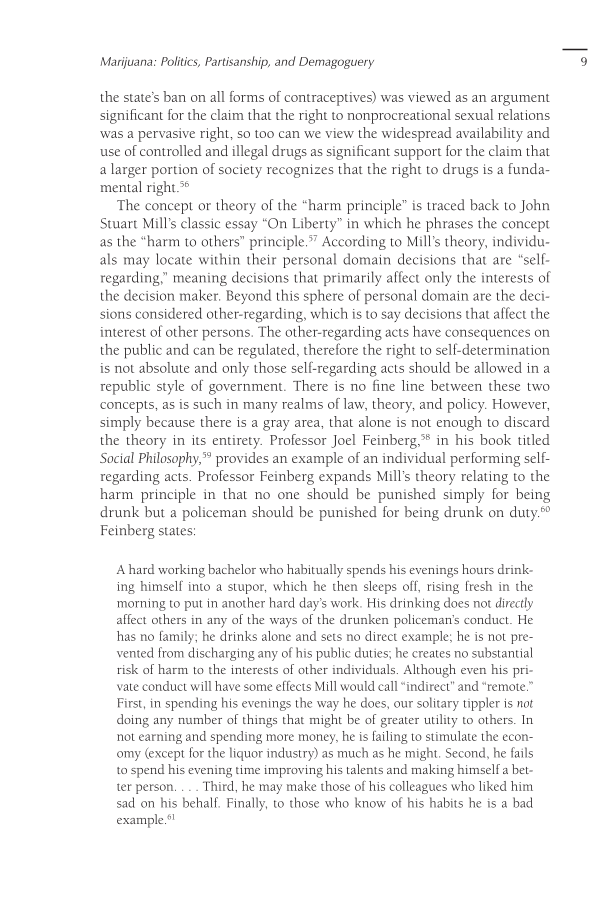Marijuana: Politics, Partisanship, and Demagoguery 9
the state’s ban on all forms of contraceptives) was viewed as an argument
significant for the claim that the right to nonprocreational sexual relations
was a pervasive right, so too can we view the widespread availability and
use of controlled and illegal drugs as significant support for the claim that
a larger portion of society recognizes that the right to drugs is a funda-
mental right.56
The concept or theory of the “harm principle” is traced back to John
Stuart Mill’s classic essay “On Liberty” in which he phrases the concept
as the “harm to others” principle.57 According to Mill’s theory, individu-
als may locate within their personal domain decisions that are “self-
regarding,” meaning decisions that primarily affect only the interests of
the decision maker. Beyond this sphere of personal domain are the deci-
sions considered other-regarding, which is to say decisions that affect the
interest of other persons. The other-regarding acts have consequences on
the public and can be regulated, therefore the right to self-determination
is not absolute and only those self-regarding acts should be allowed in a
republic style of government. There is no fine line between these two
concepts, as is such in many realms of law, theory, and policy. However,
simply because there is a gray area, that alone is not enough to discard
the theory in its entirety. Professor Joel Feinberg,58 in his book titled
Social Philosophy,59 provides an example of an individual performing self-
regarding acts. Professor Feinberg expands Mill’s theory relating to the
harm principle in that no one should be punished simply for being
drunk but a policeman should be punished for being drunk on duty.60
Feinberg states:
A hard working bachelor who habitually spends his evenings hours drink-
ing himself into a stupor, which he then sleeps off, rising fresh in the
morning to put in another hard day’s work. His drinking does not directly
affect others in any of the ways of the drunken policeman’s conduct. He
has no family; he drinks alone and sets no direct example; he is not pre-
vented from discharging any of his public duties; he creates no substantial
risk of harm to the interests of other individuals. Although even his pri-
vate conduct will have some effects Mill would call “indirect” and “remote.”
First, in spending his evenings the way he does, our solitary tippler is not
doing any number of things that might be of greater utility to others. In
not earning and spending more money, he is failing to stimulate the econ-
omy (except for the liquor industry) as much as he might. Second, he fails
to spend his evening time improving his talents and making himself a bet-
ter person. . . . Third, he may make those of his colleagues who liked him
sad on his behalf. Finally, to those who know of his habits he is a bad
example.61























































































































































































































































































































